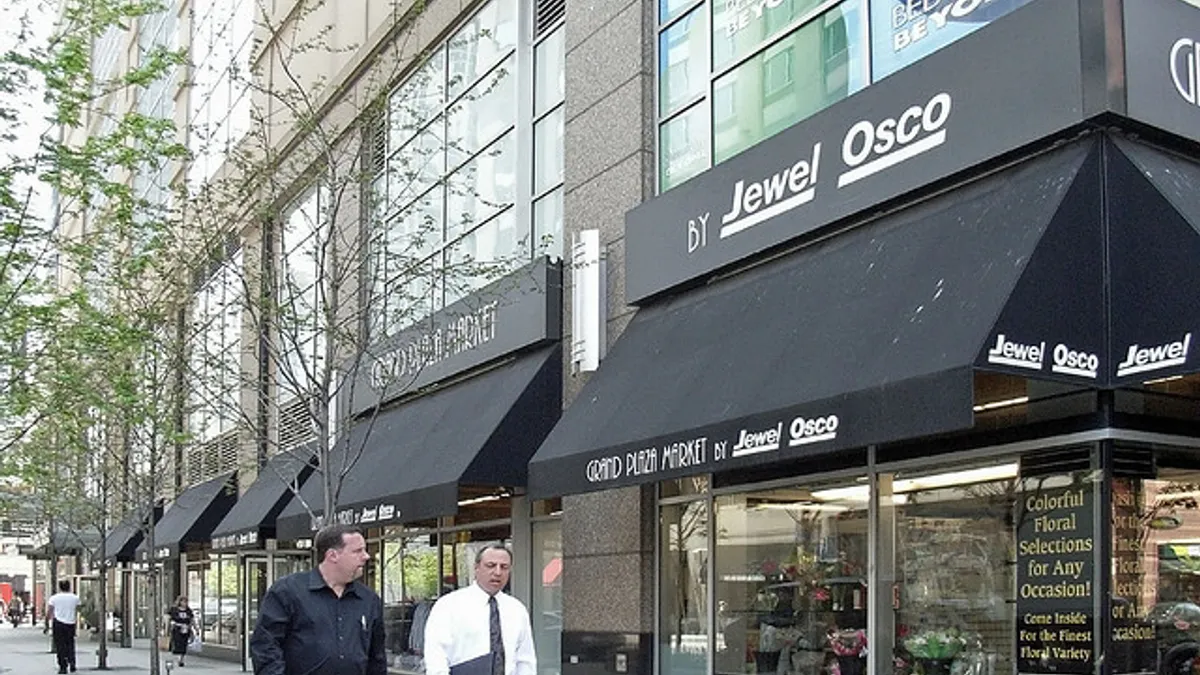Dive Brief:
- Jewel-Osco will begin offering online ordering and delivery to Chicago-area customers through its website beginning next Tuesday, according to the Chicago Tribune. The company hired 100 additional workers, purchased 60 delivery trucks, and will deliver orders from 11 stores. Jewel-Osco will also offer store pickup from six locations, though those stores have not been identified by the company.
- Delivery fees will range from 95 cents to $9.95 depending on order size, time of day and the specific time slot selected. Shoppers can receive their groceries same-day if they order before noon.
- Jewel-Osco already offers home delivery through Instacart, and will continue to do so. Asked why the company would roll out its own service in addition, Jewel-Osco president Doug Cygan told the Tribune, “We felt it was important to have our own people doing it.”
Dive Insight:
The fact that another grocery chain is adding home delivery isn’t all that notable. Scores of retailers have done so in recent months, many signing on with services like Instacart, Shipt and Deliv.
What makes Jewel-Osco’s announcement unique is that it has essentially decided to layer its own e-commerce program over one that’s already available through Instacart. That partnership, which dates back to 2013, offers same-day delivery from all of Jewel-Osco’s Chicago-area stores.
So why go to the trouble? Jewel-Osco’s parent company, Albertsons, has made building its own e-commerce service a priority, steadily building online ordering and delivery programs across the many chains it owns, including Safeway.
CEO Bob Miller had this to say in a recent interview with the Idaho Statesman:
“We’re aggressively rolling out home delivery. At the end of this fiscal year, we’ll be in eight of the 10 biggest markets in the U.S. We’re going to spend lots of money on home delivery. A place like Chicago, we’re number-one share in the supermarket sector. ... We’re going to work hard on home delivery, even though Amazon is, too, and lots of other people. We think we can compete in that space, because somebody can order the complete variety from our store.”
Building an ecommerce platform from the ground up is expensive, but Albertsons, as one of the few truly national grocery companies, has the resources to pull it off. Although overhead costs are high and profitability is elusive right now, in-house programs offer better margins and an opportunity to control the branding and customer experience. With online grocery projected to reach $100 billion in sales by 2025, it all amounts to a big bet on the future of shopping.
To support its online growth, Albertsons has focused on making top hires at the executive level, including veterans from companies like Disney and Macy’s.
The question is whether Albertsons can compete with Amazon, Walmart and Kroger, all of which are rapidly growing their online grocery footprint. In its most recent earnings report, Albertsons noted its e-commerce sales had shot up 19%. That looks pretty good, but when compared to growth metrics across the industry, it actually seems rather weak. Consulting firm Brick Meets Click puts online grocery sales growth at 25%. Walmart, meanwhile, reported a 60% increase in its ecommerce sales during its most recent financial quarter.









